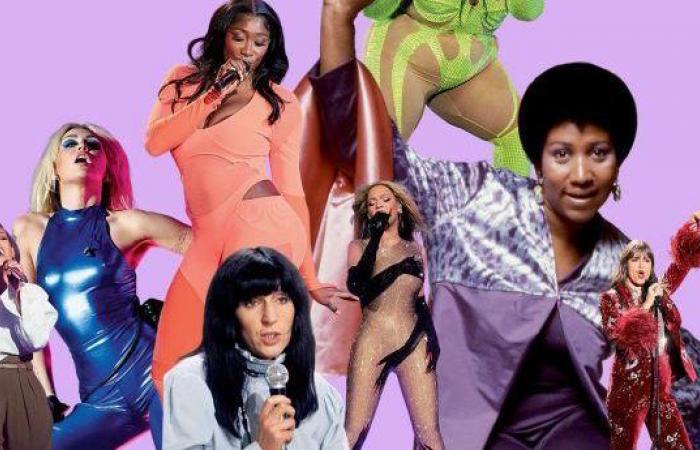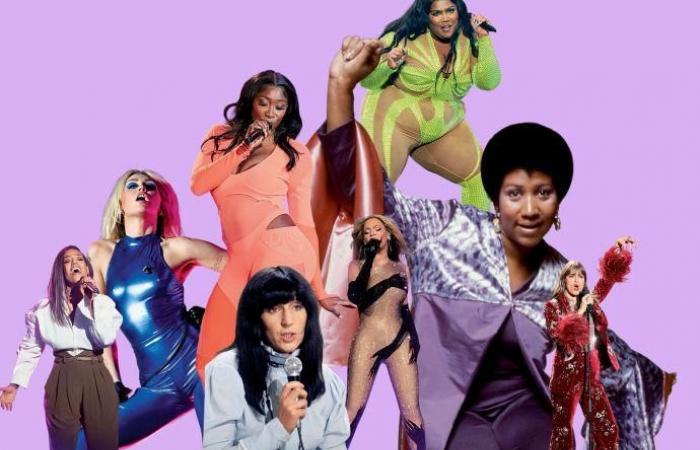Feminist culture –
When feminism manifests itself in music
On the occasion of June 14, 2023, let’s look back at the songs that resonate at the heart of the feminist strike and contribute to the emancipation of women.
Published today at 10:00 a.m.
All in their own way, Amel Bent, Miley Cyrus, Aya Nakamura, Anne Sylvestre, Lizzo, Beyoncé, Aretha Franklin and Clara Luciani have produced feminist anthems.
GETTY IMAGES/DAVID WOLFF PATRICK; GETTY IMAGES/MARCELO HERNANDEZ; GETTY IMAGES/STEPHANE CARDINALE; GETTY IMAGES/MARC PIASECKI; GETTY IMAGES/JIM DYSON; GETTY IMAGES/KEVIN MAZUR; GETTY IMAGES/ANTHONY BARBOZA; GETTY IMAGES/GEORGES CHEVRIER; MONTAGE: NAILA MAIORANA
Subscribe now and enjoy the audio playback feature.
BotTalk
This article from June 9, 2023 was imported from Femina.ch and republished on our site on January 7, 2025.
“Aiming for the Moon doesn’t scare me, even with wear and tear I still believe in it with my heart. Sacrifices, if necessary I will make them, I have already made them but always with my fist raised,” chanted Amel Bent on her first album. 19 years after its release, the R’n’B hit My philosophy resounded in feminist demonstrations. With its message of emancipation, it has become an anthem in its own right. This one, and many others: Djadja d’Aya Nakamura, Wanna Be des Spice Girls, Ain’t your Mama by Jennifer Lopez or Juice by Lizzo, to name just a few. Because music has long accompanied struggles for women’s rights.
At this point you will find additional external content. If you accept that cookies are placed by external providers and that personal data is thus transmitted to them, you must allow all cookies and display external content directly.
Allow cookiesMore info
A brief history of the feminist anthem
In his work All for the music (Ed. Hugo Image) published in October 2022, the journalist and author Chloé Thibaud traces the history of feminism in song: “It took centuries for the musical field to open up to women, she explains, and in some countries, singing and playing an instrument is not yet an acquired right for everyone. The very first feminist anthem in French dates from 1848 and was written by Louise de Chaumont on the same principle as The Declaration of the Rights of Women and Citizens by Olympe de Gouges. Louise de Chaumont modified the words of the French national anthem to make it The Marseillaise of party favorswhich demands respect from husbands towards their wives. What audacity in the 19th century! It’s a song that has stood the test of time since we still hear it during demonstrations of the Nous Tous movement in France.”
Chloé Thibaud underlines that history then made women who spoke out for their rights invisible between the end of the 19th century and until the second wave of feminism in the 1960s and 1970s. Decades which saw, in particular, the popularization of the prolific committed singer Anne Sylvestre, the birth of theWomen’s anthem of the MLF, written collectively in a political will, with the iconic title You Don’t Own Me performed by the teenager Lesley Gore, or even the great Respectadapted by Aretha Franklin from a woman’s point of view. “In this interval, we must not forget the legacy of pioneering African-American blueswomen, like Ma Rainey, Bessie Smith or Billie Holiday, who, without holding a claimed feminist discourse, created the first breaches in the patriarchal discourse” , recalls the author.
The role of pop culture
In Switzerland, since the rebirth of the June 14 strike in 2019, the anthem June fourteenth here we are is written by the Neuchâtel collective on the basis of an Italian title to make the demands of the manifesto visible. A song repeated every year since. For Chloé Thibaud, however, it is pieces from pop culture that have instead invaded current feminist events, signs and t-shirts. “Slogans are diverted, like Girls Just Want to Have Fun-damental Rights in reference to Cyndi Lauper’s song”, illustrates the author.
At this point you will find additional external content. If you accept that cookies are placed by external providers and that personal data is thus transmitted to them, you must allow all cookies and display external content directly.
Allow cookiesMore info
María Chacon, member of Grève feminist Friborg and who collaborates in enriching the official playlist of the collective for June 14, confirms that many popular titles are referenced there: “like Bad Girls from MIA, The Rage by Keny Arkana or even Flowers by Miley Cyrus. But as I am Spanish, I am particularly touched when I hear a feminist song in this language, like song without fear of Vivir Quintana,” the activist listed.
For her, music is central to the feminist strike. “It conveys powerful and emancipating messages that resonate with our demands, and also allows us to put words to difficult realities, such as femicide and rape. And beyond the meaning of the texts and our anger against the patriarchal system, the music allows the demonstration to be part of a moment of joy and solidarity.
But when did feminism emerge in music? For Chloé Thibaud, Beyoncé marked a turning point in 2011. “Yet we have come a long way because the songs of Destiny’s Child are not at all feminist, despite appearances, and give pride of place to slut-shaminglike the texts of Diam’s for example”, underlines the author, after explaining to us that she passed the Bechdel test (in cinema, a test to show the under-representation of female protagonists according to three criteria : there must be at least two women named, who speak together and about something other than a man) in the top 30 of Destiny’s Child and only Survivor came out victorious (“a title that doesn’t even talk about empowerment following a breakup, but about the separation of the group”).
“In my opinion, the song Run the World (Girls) is decisive: the clip features an army of dominant women and the claim is radical for an artist as popular as Beyoncé, analyzes Chloé Thibaud. Then she continued on this path, and this well before MeToo.
At this point you will find additional external content. If you accept that cookies are placed by external providers and that personal data is thus transmitted to them, you must allow all cookies and display external content directly.
Allow cookiesMore info
The specialist says she is tired of hearing that feminist messages are fashionable in mainstream music today. “Certainly a few titles stand out from the crowd like In Grenada by Clara Luciani or even Balance your what by Angèle, which I think was also a trigger for political awareness, particularly among the youngest, since the title takes up the hashtag #Balancetonporc and makes the message accessible, continues Chloé Thibaud. However, committed artists take more risks than others, because they are exposed to harassment on the internet. This remains a courageous approach in 2023. And even if some ride the wave, so much the better because it makes the struggles visible.”
Finally, even if music has made it possible to advance feminist movements, the author warns: sexism is still very present in this industry: “The next battle is no longer in the texts, but in the reality at the heart festivals, on stage, in institutions and studios.”
There is still work to be done
It is not Helvetiarockt who will contradict it. The association fights to make women, intersex, non-binary, trans and agender people visible in the music industry through various programs, workshops and awareness campaigns. In Switzerland too, the question of parity in the programming of concert halls and festivals is raised and has caused controversy, notably in summer 2022, when the singer Sophie Hunger criticized the exclusively male line up of the open air Moon & Stars in Ticino.
“Inequalities have become more visible in recent years,” says Elodie Romain, alias Billie Bird, head of Helvetiarockt for French-speaking Switzerland. But according to statistics from the University of Basel, the share of women was 11% in 2021 on stage in pop, rock and jazz, 2% in musical production and 12% in teaching. A study by Pro Helvetia from 2022 shows much the same thing. So despite everything, the numbers are not increasing or very slowly and these artists remain in a precarious situation,” she denounces.
The problem? For Helvetiarockt, it is multifactorial. “The less these people evolve in decision-making contexts, the less measures will be taken to their advantage. And the lack of role models doesn’t encourage you to get started either,” insists Elodie Romain. June 14 is an opportunity to put these inequalities back on the table.
Sandor and Silance sing about anti-sexism in video
During an interview in February, singer Sandor confided her desire to create a feminist anthem with her title The limits of your intelligence. She gave us an idea: to highlight French-speaking “feminist anthems” – i.e. committed titles –, written and performed by women, to celebrate the national day of feminist mobilization in music. Silance joined the adventure with his song New genre.
At this point you will find additional external content. If you accept that cookies are placed by external providers and that personal data is thus transmitted to them, you must allow all cookies and display external content directly.
Allow cookiesMore info
At this point you will find additional external content. If you accept that cookies are placed by external providers and that personal data is thus transmitted to them, you must allow all cookies and display external content directly.
Allow cookiesMore info
Laurène Ischi is a journalist within the digital team at Tamedia. After a bachelor’s degree in literature in Lausanne, she obtained her master’s degree at the Academy of Journalism and Media of the University of Neuchâtel in 2021. She is passionate about social issues and worked for “Femina” for 4 years.More info
Did you find an error? Please report it to us.
0 comments







